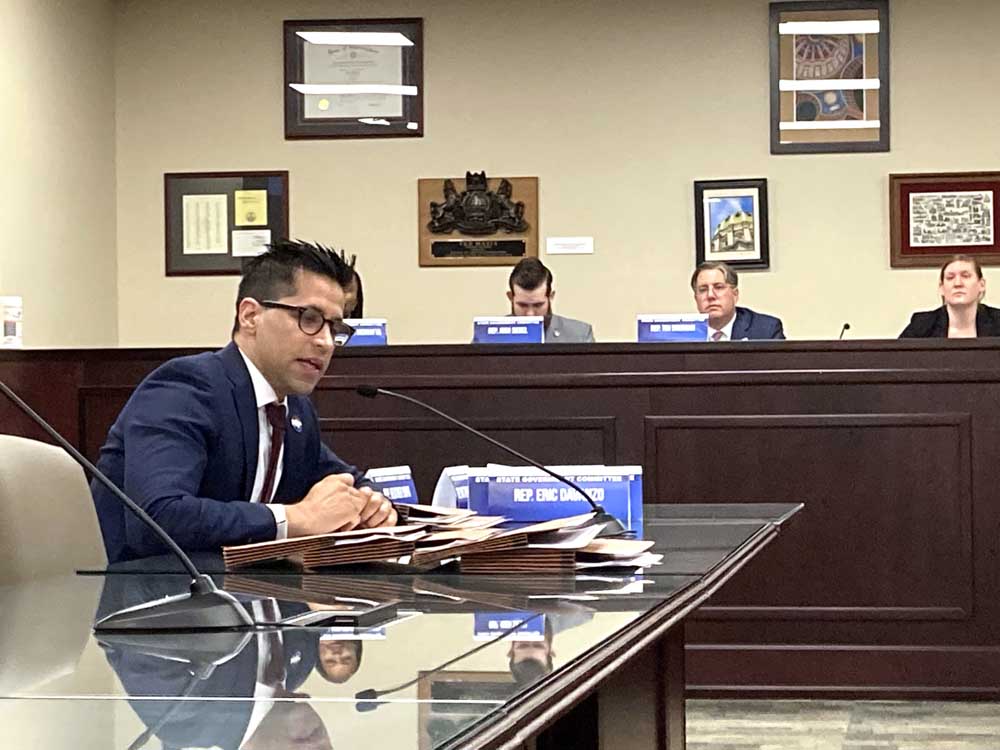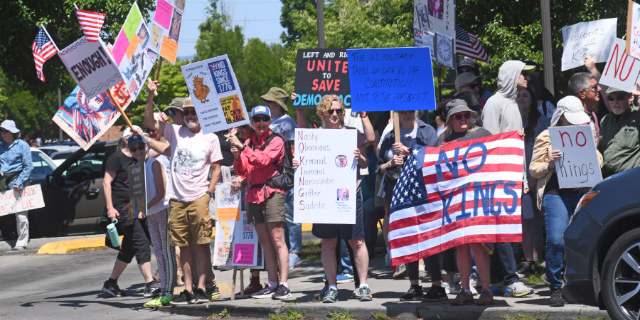Pa. House panel advances bills to curtail ‘dark money’ and AI-generated political impersonations
Published 5:00 pm Monday, June 24, 2024

- Rep. Tarik Khan, D-Philadelphia, speaks on Monday in a committee meeting in the state Capitol about his bill that is intended to banish artificial intelligence-created misrepresentations of political candidates. (Ford Turner/Pittsburgh Post-Gazette/TNS)
HARRISBURG, Pa. — A pair of bills that attempt to curb election influence garnered in two different ways — via so-called “dark money” and by artificial intelligence — advanced in bipartisan committee votes on Monday, although it appears neither is a finished product.
Both passed the Democrat-controlled House State Government Committee with all Democrats and some Republicans in support. Both will move to the full House for consideration, as lawmakers on Monday began a busy week of voting and negotiating ahead of the June 30 state budget deadline.
The Post-Gazette reported over the weekend that dark money — political contributions that take advantage of federal or state legal gaps to remain untraceable — played a role in the recent, high-profile campaign for Allegheny County executive.
Rep. Joe Webster, D-Montgomery and prime sponsor of the bill on political contributions, described the problem as straightforward. Currently, he said, laws prohibit foreign citizens and groups from spending in Pennsylvania elections, but corporations can make contributions even if they are partially owned by foreign entities.
One of Webster’s concerns, he said, is “what we today call ‘dark money.'”
The intent of the bill was praised by members of both parties. Rep. Tim Bonner, R-Mercer, said it was an excellent concept.
But several Republicans had concerns. Rep. Brad Roae, R-Crawford and the top Republican on the committee, said that despite good intentions the wording of the bill was too vague. Beyond that, he said Republicans only got a look at the bill for the first time on Friday.
The topic was complex, he said, and “having bills stuck on the voting session at the last minute really makes that a challenge.”
Rep. Paul Schemel, R-Franklin, said he was voting ‘no’ because exceptions created by the bill would allow foreign-owned corporations to contribute to labor unions, which in turn could make political donations.
After the meeting, Webster said he would consider some of the contested aspects highlighted during the meeting.
Separately, the panel passed a bill sponsored by Rep. Tarik Khan, D-Philadelphia, that attempts to banish AI-generated impersonations that misrepresent people from political campaigns.
“As AI gets more and more advanced it gets harder and harder to tell what’s real and what’s fake,” Khan said. The point of the bill, he said, is “to make sure that in campaign advertisements that deceptive content that is generated by AI technology — such as deepfakes that are maliciously used to deceive voters — is being regulated.”
Controversy already has occurred.
Political consultant Steven Kramer, a Louisiana resident who also is known in New York political circles, was indicted in New Hampshire on charges of felony voter suppression and misdemeanor impersonation of a candidate. The charges stemmed from an investigation of robocalls using a faked voice of President Joe Biden before the New Hampshire primary election, urging Democratic voters not to go to the polls.
Khan’s bill calls for offenders to be hit with a tiered system of fines: $15,000 for each day the fraudulent material is disseminated concerning a candidate for municipal office, ranging up to $250,000 a day when the impersonation target is a candidate for president, the U.S. Senate or U.S. House.
Rep. Melissa Shusterman, D-Chester, said she worked in television before getting elected to the House and it was acknowledged that the editing process could be used in the wrong way.
“I kind of look at AI as editing on steroids,” she said. “This is a step in the right direction.”
Several Republicans challenged certain aspects of the bill but nonetheless said it was timely. Roae wondered why the bill’s prohibitions did not take effect until 90 days before an election — meaning, he said, someone could use political deepfakes 91 days before an election without being challenged.
Rep. Jamie Barton, R-Schuylkill, said “it’s hard to tell what’s real and what’s fake” and lawmakers need to get the bill moving.
______






